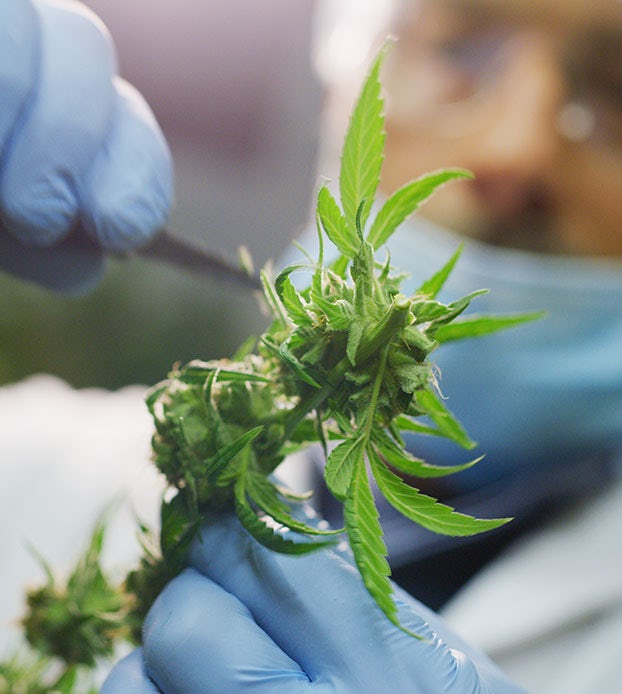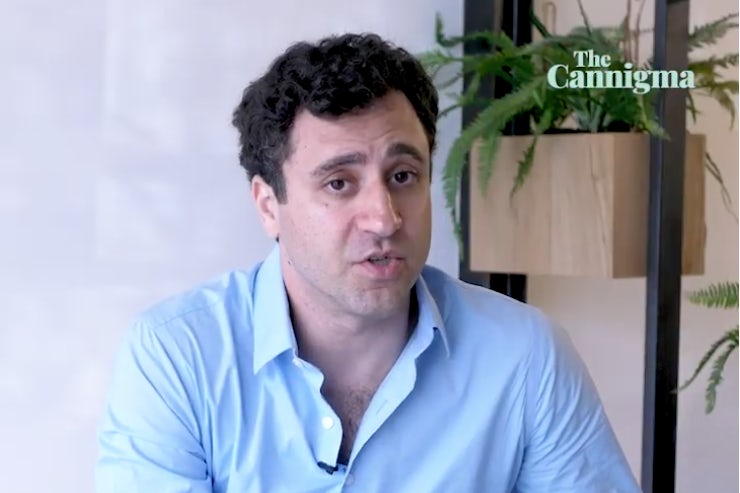“We have to listen to our patients,” Dr. Kirsten Muller-Vahl repeats several times. It was hearing her patients with Tourette’s, ADHD and other neurological conditions tell her how they got relief by self-medicating with cannabis, after all, that drove her to become one of the world’s premier cannabinoid researchers.
But that type of anecdotal evidence isn’t enough. “In the end you always need controlled trials because otherwise you cannot differentiate between pharmacological effects and placebo effects,” she explains.
Today, Dr. Muller-Vahl is conducting a broad clinical study on using cannabis to treat Tourette’s in Germany.
If those controlled clinical trials aren’t conducted, “in 10 years, [the skeptics will] ask us where are the studies? You are talking about cannabinoids and their potential in all these different diseases, but there’s nothing.”

Of course, conducting clinical trials on cannabis is not an easy task. In addition to the question of funding, more practical concerns can stand in the way — for instance, how do you create a placebo to stand in for inhaled cannabis flower? How do you create a placebo version of a joint?
This episode was edited by Michael Schaeffer Omer-Man, and was produced by Michael Schaeffer Omer-Man, Elana Goldberg, and Matan Weil. Music by Desca.
Full transcript:
Elana: Hi Kirsten, great to have you here with us today. Amongst many other things, would it be fair to say that you’re an expert on cannabis and how it works with the brain?
Dr. Kirsten Muller-Vahl: Yeah.
Elana: Okay. So I want to start off here before we get into your work, with an explanation: How does cannabis work on the human brain?
Dr. Muller-Vahl: Oh, this is, this is a difficult question I would say.
Elana: Yeah.
Dr. Muller-Vahl: No one in the world is able to answer this question currently, but yes, indeed it, there’s a complex interaction. And perhaps cannabis is the substance that has the most complex interaction with the brain among all compounds we know that interact with the brain. And this makes it so specific. This makes it so interesting, but this makes it also so difficult to understand all the effects that cannabis and all the cannabinoids in cannabis have on the brain.
Elana: Okay. So we don’t know how to explain how cannabis works on the human brain. Uh, what do we know?
Dr. Muller-Vahl: We know that cannabi can be helpful in some conditions. We know or have at least some evidence that it might be helpful in some psychiatric and some neurological diseases.
I’m very careful because the database is still very weak. We have a lot of preclinical data that suggest a lot, but we have only a very pure clinical database and this makes it very difficult to currently to come to a final conclusion. So, um, I would say we have some good data that suggests that, um, cannabinoids, when we spoke about the whole group, including THC, CBD, all these different cannabinoids that cannabinoids might be effective in the treatment of Tourette’s and Tics. I’m very optimistic that cannabinoids are also effective in the treatment of, um, ADHD.
I think there are some promising data about autism spectrum disorder. Then we have some data, not primarily from patients suffering from anxiety and depression, but we have some data from patients suffering from pain or spasticity in multiple sclerosis where we see that cannabinoids improve their mood. The cannabinoids improve anxiety, that cannabinoids improve sleeping, sleeping problems. Um, but we are missing studies that primarily focus on these specific diseases.
Elana: Right. So it’s more at the symptom level rather than condition indication level.
Dr. Muller-Vahl: Exactly. And then, um, I think when we talk about treatment, then we can also speculate about things like neuro protection or neuro repair because we have some preclinical evidence that cannabinoids might be neuroprotective and with, when this is really true in humans, then we could use cannabinoids to treat patients suffering from neurodegenerative diseases.
So currently the database is weak and we do not have good clinical data suggesting that we should use cannabinoids in the treatment of Parkinson’s disease, Huntington’s disease, Alzheimer’s disease and so on and so on. It has been used. The, um, studies are small.
Elana: Right.
Dr. Muller-Vahl: Some of them are open and uncontrolled. They report that there’s some improvement in patients. Um, with respect to agitation, sleeping problems, mood, things like this. But the clinical work so far hasn’t shown that cannabinoids might be neuro-protective. And perhaps we start too late in the course of the disease. And this is a very interesting discussion at the moment that perhaps we have some problems transferring preclinical work to our patients. And perhaps we use the wrong dosage, the wrong substance, the wrong side time point. And this is something we have to figure out in the future.
Elana: Right. And what do we need to do? Or what do you need to do more accurately in order to bridge that gap?
Dr. Muller-Vahl: I think we have to listen to our patients. We have to listen to the basic research and then we have to try to bring this together. We have to identify those conditions where we feel that we have good evidence, a good hypothesis that cannabinoids might be effective. And then, and this is the most important point, we have to do well-powered clinical trials. And then you will see whether it’s effective, yes or no.
But before you start this kind of clinical trial because it’s really very expensive. You have to think carefully what is the best indication? What is the best substance? Which cannabinoids do you want to use? Which dose do you want to use? Which kind of patients do you want to include? At which stage of the disease, mildly affected, severely affected patients, treatment resistant patients. So a lot of questions you have to answer before you decide to start a study.
And then the main problem, and this is I’m struggling with — to find a sponsor who is willing to give you the money because clinical trials, at least in Germany, you have to spend, let’s say 2 million, 3 million euros depending on the sample size on the protocol. But it’s, it’s expensive.
But it’s urgently needed. And when we do not do this, then I feel that those people who are skeptical, will in the end, um, in 10 years, let’s say, ask us where are the studies? You are talking about cannabinoids and their potential in all these different diseases, but there’s nothing. And then we don’t have any arguments.
Elana: Right.
Dr. Muller-Vahl: Therefore, I think this is really, really important that all those people who are working in this area, and this is um, the basic researchers, the clinical researchers, the industry, um, but also the governments, they have to work together, they have to spend the money and then we are able to do this kind of clinical research.
Elana: You mentioned before that there are certain studies on ADHD that you’re looking to design. Can you tell us a bit more about, uh, you know, the interest in this line of treatment and why, why you want to research it?
Dr. Muller-Vahl: Yeah, there are two major issues. Let… Letting me, um, think that, um, cannabinoids might be an effective treatment for at least the adults. So we are talking about adult patients and this is always the first step and thereafter we can talk about treatment in children.
So, I think all over the world, we know that patients suffering from ADHD use cannabis. This is something all psychiatrists know. And in the past, we all thought that this is a kind of an addiction. So we thought this is a comorbidity. The first suggestion when someone who suffers from ADHD and who uses cannabis comes to his doctor, the doctor recommends to stop using cannabis because you are addicted. But I think we should look at this from the other side. And I feel that um, most of the patients use cannabis as a kind of a self medication.
And I’ve talked to so many patients who really said to me that, “When using cannabis, I really can reduce my symptoms and it’s more effective and better tolerated than all the gold standard treatment you can prescribe to me.” And I have some patients who, um, really started using cannabis and only therefore, and after that they were able to finish school or go to the university. They say, before I have an exam, I use some cannabis because then I concentrate, I can concentrate much better.
And the same stories we hear from our patients suffering from Tourette’s because um, nearly half of the patients suffering from Tourette’s have, um, Comorbid ADHD. And therefore, um, I hear these reports also from my patients suffering from Tourette’s. And this makes me believe that cannabis might be effective. The database is very weak. This is… I would say it’s really a shame because ADHD is a common neuro developmental disorder.
Elana: Right.
Dr. Muller-Vahl: And it’s a shame that we as medical doctors do not adhere to our patients. We want to see this aspect of addiction and we completely ignore that there are patients who can use it without being addicted.
And therefore, I think it’s really important and our duty to further look into this. And at least in Germany, the guidelines say that cannabis should not be used in patients suffering from ADHD. There’s one sentence — we have a quite new guideline and there’s only one sentence in it: Don’t use cannabis in ADHD. It’s absolutely clear and this makes it currently very difficult, although we have this Cannabis law in Germany, but it still makes it very difficult to treat patients suffering from ADHD, at least when you want to have the health insurance covering the costs.
Elana: Right. It’s really interesting,this finding, because it’s kind of counterintuitive when most people are used to a standard treatment for ADHD being Ritalin or Adderall, which to my understanding, has kind of an opposite effect from cannabis. How do you explain that?
Dr. Muller-Vahl: So, um, absolutely. One more sentence to this ADHD story because I like this, because it was the same as we started nearly 20 years ago with our research in Tourette’s. So I’m asking all my patients, and I’m still doing this today, “what makes your tics worse and what makes your tics less?” And at that time, some, most of them are younger men. They said, “Okay, when I smoke a joint, then I feel that my tics go down.”
And this was the first beginning of our research and I feel this is — In this area, with cannabis, this is a good idea to listen to the patients, what they report. This does not mean that it’s really effective. It still might be that there’s a strong placebo effect.
Elana: Sure.
Dr. Muller-Vahl: But it makes sense to further investigate this at least in those groups of patients where we do not have other effective treatments. All we… Where we have in, in case of Tourette’s patients, we use antipsychotics to treat tics. So, um, this is a kind of medication that is, uh, associated with a lot of side effects and therefore a lot of patients do not like to use this kind of medication.
Elana: Right. I’m hearing you say over and over again that we need to listen to our patients and it makes me think about the importance of real world evidence or anecdotal evidence in this story. Do you have some sort of methodology for putting together these kinds of reports that you’re getting from your patients together with the clinical and preclinical data?
Dr. Muller-Vahl: Yeah, so it depends on what, what data you have. So for example, in Tourette’s, that does not make any sense to collect data from our patients on what they report because we already did this. Now we need well designed and well powered randomized control trials because this will bring us one step forward. But there are other conditions where we have absolutely no data. And there it’s a good idea to start with surveys, with real world data, but in some indication this does not bring us forward. For example, in pain, at least in my opinion, it does not make any sense to repeat it again and again and again. But um, in those indications where we already have some data, we have to go one step further and have to use the gold standard for clinical research, and these are the double blind, placebo controlled, randomized trials.
But in those indications where we have nothing, it definitely makes sense to start with the survey or with real world data and then to use this to build a hypothesis on and to think about how to design a clinical trial. But in the end, and this is what I believe because I’m a clinician, I’m a scientist — And in the end you always need controlled trials because otherwise you cannot differentiate between pharmacological effects and placebo effects.
Elana: Okay. I’m hearing that the design of the study is really important in order to get the results that are going to be reliable and something that you can work with afterwards. Just for any of our listeners that don’t necessarily understand what a controlled trial entails, can you kind of break that down for us?
Dr. Muller-Vahl: Yeah. So controlled trial means what we say a randomized, double blind, placebo controlled trial, this means that you use a substance, in this case, cannabis and you compare the efficacy and the safety of this substance to a placebo. And double blind means that neither the patient nor the researcher knows who receives what. And then randomized means that there is no specific order in which the placebo and the active drug is given to the patient.
And this is at least to our current opinion, more or less the gold standard for clinical trials. That’s a lot of discussion about study designs. But I would say for most substances, and for most conditions, this is really the gold standard. There are a lot of aspects you can modify.
You can use two arms, three arms, you can include more or less patients and things like this. There is a lot of possibility, you can modify. But this is at least currently our gold standard. And I think also in the world of cannabis we have to accept this. And therefore it’s expected that we perform these kinds of clinical trials. And then we know whether cannabinoids are effective. And when you use an active comparator, we even will know whether cannabis is superior than other substances used in this specific indication.
Elana: Focusing on the most recent trial you are putting together, is this isolates or whole plant preparations that you’re using?
Dr. Muller-Vahl: So the current study, we use cannabis extract. More specifically we use Nabiximols and therefore it’s easy to have a placebo control because this is offered by the company. And we decided for Nabiximols because at the time when we designed this study, and this is six years ago, this illustrates how long it takes from the very first planning until the study is completed. At that time, um, Nabiximols was the only cannabis extract available in Germany. It was the only substance that was officially licensed in… Not Tourette’s of course, but specificity in patients suffering from multiple sclerosis. This makes it a little bit easier to perform a clinical trial. And GW agreed to offer the substance that this was also very helpful.
And the placebo problem is much easier because doing a trial with the cannabis flower and using a placebo is not so trivial. You really have to carefully think that this study is still blinded. My best idea currently is that you use new inhalers that are smokeless and where patients cannot smell the cannabis. They are, I would say it’s — when using this kind of new inhalers but they are not on the market currently, then it would be possible to have a completely double blind study. Otherwise it’s at least in my opinion, nearly impossible because when you give the flowers to the patient and they have to fill it in the filling chamber of a vaporizer, they know what they are taking. So this is not really blind. This is a huge problem using cannabis flowers.
Elana: Right. You kept mentioning that what you’re hearing from your patients was that they smoked a joint and then they felt better. So I suppose first of all, there’s the issue of the study design as you mentioned. And then also I guess the delivery method itself. Do we have any data at this point to show which delivery method is more effective?
Dr. Muller-Vahl: So we tried to disentangle this, we did a retrospective analysis and a prospective survey asking our patients which kind of cannabis and which mode of administration do you prefer. And it’s not that clear because the… It was open, uncontrolled, the sample size was small. But what I can say is when you want to treat Tics, you need THC. Pure CBD is ineffective. This is absolutely, absolutely clear from my perspective.
And those patients who use cannabis flowers, at least in my clinic, they prefer high THC cannabis flowers. There is no single patient who uses a cannabis flower with let’s say 5-6%. Some of them combine it, but when it comes to the treatment of tics, they prefer high THC cannabis flowers. And I’m open for all kinds of cannabinoids. I am open when patients want to use different types of medications so that they are able to compare and identify what works best for them. I have a lot of patients who like to vaporize cannabis but most of these patients had some experience with cannabis before they came into my office. And then I see no reason to change this when they report, “Okay, using cannabis is helpful for me.” Why should I then prescribe something else?
Most of those patients who do not smoke, who never used cannabis before, they prefer an oral intake. The bio-availability is completely different. We have to keep this in mind. But what I see it’s also effective. Pure THC is also effective and we started our research with pure THC because at that time nothing else was available. But compared to cannabis extracts and cannabis flowers, I would say, um, it’s comparable, effective, but perhaps a little bit less tolerated. And with pure THC I would say. But it’s only my personal experience. I would say people report about more side effects compared to cannabis extracts and flowers.
Elana: Right. So it sounds like a lot of it comes down to as well as you know, obviously your personal experience, but the personal preference and experience of the patient.
Dr. Muller-Vahl: And I’ve also some patients who like to combine different substances. So, for example, a patient who uses a [inaudible] cannabis extract, and then in addition to use when his tics increase dramatically, had a specific situation then to use an inhaler, then to have a strong and immediate effect. And this is also a good idea to treat, at least tics.
Elana: It sound like it’s very individualized treatment.
Dr. Muller-Vahl: Yeah, exactly.
Elana: I want to finish up at the beginning and ask you: How did you get into working with cannabis?
Dr. Muller-Vahl: So I’m a neurologist and psychiatrist. And more than 25 years ago I decided to become a specialist in Tourette’s. And this is quite good when youare both the psychiatrist and a neurologist because it’s a neuropsychiatric disorder. Patients suffering from Tourette’s suffer from tics. This is a kind of a movement disorder. And 80 to 90% of our patients suffer from psychiatric comorbidities. And this is something neurologists are not so familiar with. When I started to care for these patients, I always asked my patients, “What helps you? What brings your tics up out, down?” This is, um, something, something that is very typical for tics that takes wax and wane over time. A lot of patients reported that when they use cannabis, this is helpful.
When I heard it again and again, I decided to start with the survey. So we specifically asked our patients, “Have you ever used cannabis? And what happened after using cannabis?” And in parallel we asked for effects when using alcohol and nicotine. And what we found was that the effects when using cannabis were much better compared to the effect the patient felt after use of alcohol and nicotine. And at that time — it’s more than 20 years ago — it was not allowed in Germany to prescribe or to use cannabis in a clinical trial. And we imported Marinol from the U.S. and gave it to one single patient.
He was a man who used cannabis before. We have asked him to stop using cannabis, gave him pure THC and just looked at what happened. And his tics went down. He had no side effects. And after we had seen this, we decided to move forward with the single dose trials. Again, we use pure THC and it was a crossover design. We included 12 patients and we saw a positive effect. And thereafter after we decided for a double blind placebo controlled trial. It was a group trial that included 24 patients. Again, we saw a positive effect. And currently we are performing a larger trial — it’s again double blind placebo controlled and the aim is to include 96 patients. Recruitment is going very well. So currently about 80 patients are included. This is a study that is a multicenter study all over Germany. And we expect to complete recruitment in April or May this year and hopefully at the end of this year we will have the results of this study.
Elana: Amazing. Really fascinating stuff. Thanks so much for speaking with me today.
Dr. Muller-Vahl: Thank you.
Sign up for bi-weekly updates, packed full of cannabis education, recipes, and tips. Your inbox will love it.

 Shop
Shop Support
Support














